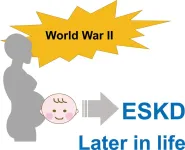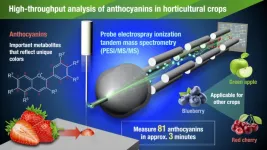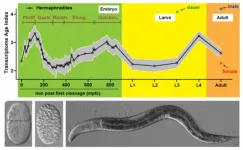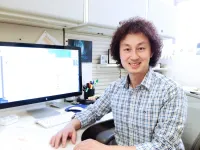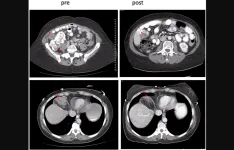Landmark study finds no difference in psychological wellbeing or quality of family relationships between children born by assisted reproduction (egg or sperm donation or surrogacy) and those born naturally at age 20. However, findings suggest that telling children about their biological origins early – before they start school – can be advantageous for family relationships and healthy adjustment. The study, by University of Cambridge researchers, is the first to examine the long-term effects of different types of third-party assisted reproduction on parenting and child adjustment, as well as the first to investigate prospectively the effect of the age at which children were told that they were conceived by egg donation, sperm donation or surrogacy.
The results, published today in Developmental Psychology, suggest that the absence of a biological connection between children and parents in assisted reproduction families does not interfere with the development of positive relationships between them or psychological adjustment in adulthood. These findings are consistent with previous assessments at age one, two, three, seven, ten and 14.
The findings overturn previous widely held assumptions that children born by third-party assisted reproduction are at a disadvantage when it comes to wellbeing and family relationships because they lack a biological connection to their parents.
“Despite people's concerns, families with children born through third-party assisted reproduction – whether that be an egg donor, sperm donor or a surrogate – are doing well right up to adulthood,” said Susan Golombok, Professor Emerita of Family Research and former Director of the Centre for Family Research, University of Cambridge, who led the study.
However, they found that mothers who began to tell their children about their biological origins in their preschool years had more positive relationships with them as assessed by interview at age 20, and the mothers showed lower levels of anxiety and depression. Most of the parents who had disclosed did so by age four and found that the child took the news well. This suggests that being open with children about their origins when they are young is advantageous.
In addition, in the final stage of this 20-year study, mothers who had disclosed their child’s origins by seven years old obtained slightly more positive scores on questionnaire measures of quality of family relationships, parental acceptance (mother’s feelings towards young adult), and family communication. For example, only 7% of mothers who had disclosed by age 7 reported problems in family relationships, compared with 22% of those who disclosed after age 7.
The young adults who had been told about their origins before seven obtained slightly more positive scores on questionnaire measures of parental acceptance (young adult’s perception of mother’s feelings towards them), communication (the extent to which they feel listened to, know what’s happening in their family and receive honest answers to questions), and psychological wellbeing. They were also less likely to report problems on the family relationships questionnaire; whereas 50% of young adults told after age 7 reported such problems, this was true of only 12.5% of those told before age 7.
“There does seem to be a positive effect of being open with children when they’re young – before they go to school – about their conception. It’s something that’s been shown by studies of adoptive families too,” said Golmobok.
Researchers from the University of Cambridge followed 65 UK families with children born by assisted reproduction – 22 by surrogacy, 17 by egg donation and 26 by sperm donation – from infancy through to early adulthood (20 years old). They compared these families with 52 UK unassisted conception families over the same period.
“The assisted reproduction families were functioning well, but where we did see differences, these were slightly more positive for families who had disclosed,” said Golombok.
Reflecting on their feelings about their biological origins, the young adults were generally unconcerned. As one young adult born through surrogacy put it, “It doesn’t faze me really, people are born in all different ways and if I was born a little bit differently - that’s OK, I understand.”
Another young adult born through sperm donation said, “My dad’s my dad, my mum’s my mum, I've never really thought about how anything’s different so, it's hard to put, I don’t really care.”
Some young adults actively embraced the method of their conception as it made them feel special, “I think it was amazing, I think the whole thing is absolutely incredible. Erm…I don’t have anything negative to say about it at all.”
Researchers found that egg donation mothers reported less positive family relationships than sperm donation mothers. They suggest that this could be due to some mothers’ insecurities about the absence of a genetic connection to their child. This was not reflected in the young adults’ perceptions of the quality of family relationships.
The team also found that young adults conceived by sperm donation reported poorer family communication than those conceived by egg donation. This could be explained by the greater secrecy around sperm donation than egg donation, sometimes driven by greater reluctance of fathers than mothers to disclose to their child that they are not their genetic parent, and a greater reluctance to talk about it once they have disclosed.
In fact, researchers found that only 42% of sperm donor parents disclosed by age 20, compared to 88% of egg donation parents and 100% of surrogate parents.
“Today there are so many more families created by assisted reproduction that it just seems quite ordinary,” said Golombok. “But twenty years ago, when we started this study, attitudes were very different. It was thought that having a genetic link was very important and without one, relationships wouldn’t work well.
“What this research means is that having children in different or new ways doesn’t actually interfere with how families function. Really wanting children seems to trump everything – that’s what really matters.”
This research was funded by a Wellcome Trust Collaborative Award.
The Centre for Family Research is collaborating with the Fitzwilliam Museum on a new exhibition, Real Families: Stories of Change (October – 7 January 2024), curated by Professor Golombok. The exhibition will explore the intricacies of families and family relationships through the eyes of artists including Paula Rego, Chantal Joffe, JJ Levine, Lucian Freud and Tracey Emin.
Professor Susan Golombok is author of We Are Family: What Really Matters for Parents and Children (Scribe) which describes researching new family forms from the 1970s to the present day.
ENDS.
Reference:
Golombok, S., Jones, C., Hall, P., Foley, S., Imrie, S., & Jadva, V. A longitudinal study of families formed through third-party assisted reproduction: Mother-child relationships and child adjustment from infancy to adulthood. Developmental Psychology DOI: 10.1037/dev0001526
Jadva, V., Jones, C. M., Hall, P., Imrie, S., & Golombok, S. “I know it’s not normal but it’s normal to me and that’s all that matters”: The experiences of young adults conceived through egg donation, sperm donation and surrogacy. Human Reproduction DOI: 10.1093/humrep/dead048
Contact details:
Charis Goodyear, University of Cambridge Charis.Goodyear@admin.cam.ac.uk
Professor Susan Golombok, University of Cambridge seg42@cam.ac.uk
About the University of Cambridge
The University of Cambridge is one of the world’s leading universities, with a rich history of radical thinking dating back to 1209. Its mission is to contribute to society through the pursuit of education, learning and research at the highest international levels of excellence.
Cambridge was second in the influential 2023 QS World University Rankings, the highest rated institution in the UK.
The University comprises 31 autonomous Colleges and over 100 departments, faculties and institutions. Its 20,000 students include around 9,000 international students from 147 countries. In 2022, 72.5% of its new undergraduate students were from state schools and more than 25% from economically disadvantaged backgrounds.
Cambridge research spans almost every discipline, from science, technology, engineering and medicine through to the arts, humanities and social sciences, with multi-disciplinary teams working to address major global challenges. In the Times Higher Education’s rankings based on the UK Research Excellence Framework, the University was rated as the highest scoring institution covering all the major disciplines.
The University sits at the heart of the ‘Cambridge cluster’, in which more than 5,200 knowledge-intensive firms employ more than 71,000 people and generate £19 billion in turnover. Cambridge has the highest number of patent applications per 100,000 residents in the UK.
www.cam.ac.uk
Real Families: Stories of Change
6 October – 7 January 2024
Real Families is a major exhibition exploring the intricacies of families and family relationships through the eyes of artists. The theme of the family has been interpreted and represented for centuries, but, especially during the last fifty years, Western ideas of what makes a family and how family life is experienced have been transformed by advances in science and by changes in social attitudes and law. Developed in collaboration with the world-leading Centre for Family Research at the University of Cambridge, the exhibition shows how the joys, tensions and transitions in families have little to do with conforming to traditional structures. Instead, acceptance, rejection, conflict and comfort arise from relationships within family groups of all kinds, and through connections with the outside world. Painting, photography, video, sculpture and installations by artists including Paula Rego, Chantal Joffe, JJ Levine, Lucian Freud and Tracey Emin tell moving and enduring stories of intimacy, alienation and everything in between.
END

